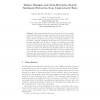Free Online Productivity Tools
i2Speak
i2Symbol
i2OCR
iTex2Img
iWeb2Print
iWeb2Shot
i2Type
iPdf2Split
iPdf2Merge
i2Bopomofo
i2Arabic
i2Style
i2Image
i2PDF
iLatex2Rtf
Sci2ools
122
click to vote
KDD
2004
ACM
2004
ACM
Markov Blankets and Meta-heuristics Search: Sentiment Extraction from Unstructured Texts
Extracting sentiments from unstructured text has emerged as an important problem in many disciplines. An accurate method would enable us, for example, to mine online opinions from the Internet and learn customers' preferences for economic or marketing research, or for leveraging a strategic advantage. In this paper, we propose a two-stage Bayesian algorithm that is able to capture the dependencies among words, and, at the same time, finds a vocabulary that is efficient for the purpose of extracting sentiments. Experimental results on online movie reviews and online news show that our algorithm is able to select a parsimonious feature set with substantially fewer predictor variables than in the full data set and leads to better predictions about sentiment orientations than several state-of-the-art machine learning methods. Our findings suggest that sentiments are captured by conditional dependence relations among words, rather than by keywords or high-frequency words.
Conditional Dependence Relations | Data Mining | Fewer Predictor Variables | KDD 2004 | Two-stage Bayesian Algorithm |
| Added | 30 Nov 2009 |
| Updated | 30 Nov 2009 |
| Type | Conference |
| Year | 2004 |
| Where | KDD |
| Authors | Edoardo Airoldi, Xue Bai, Rema Padman |
Comments (0)

